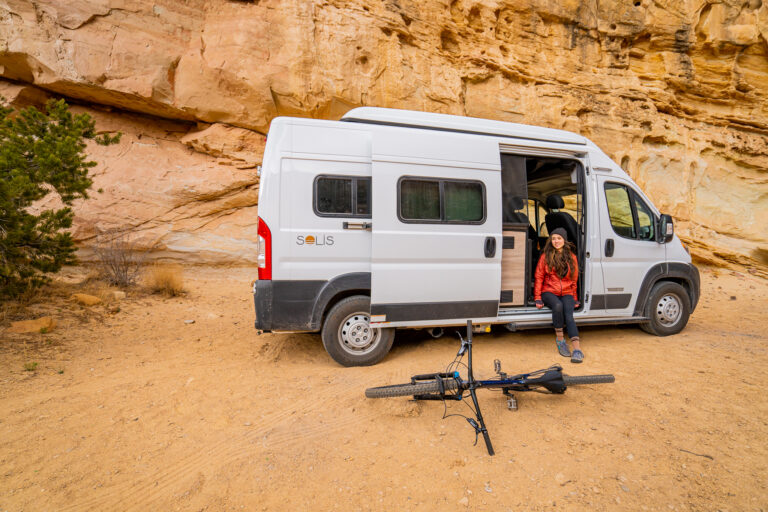
Before embarking on your road trip adventure, it’s important to understand the latest RV regulations. We dive into the 2025 RV Regulations, focusing on everything from environmental upgrades to nuanced parking laws, ensuring your journey is as smooth as the open road ahead.
Unpacking Major Changes in 2025 Regulations
With 2025more than halfway over, there are crucial regulatory updates, especially concerning heavy-duty diesel engines in motorhomes.
A significant shift is seen in the RV Clean Idle provisions, which mandate new compliance labels for motorhomes operating in California. This change underscores a broader commitment to environmental stewardship and public health:
- Introduction of Compliance Labels: Starting January 1, 2024, all heavy-duty diesel motorhomes must display a “Clean Idle” label to certify compliance with updated emission standards.
- Consequences of Non-compliance: Vehicles without this certification will face registration issues in California, highlighting the importance of adherence for both manufacturers and owners.
- Broader Environmental Impact: These regulations aim at drastically reducing nitrogen oxide (NOx) emissions from diesel engines, contributing to cleaner air and better health outcomes.
Summary of Key Changes:
- Mandatory Clean Idle labels on all new heavy-duty diesel motorhomes.
- Stricter emission standards for RV engines.
- Enhanced engine testing procedures to ensure compliance.
Environmental Impact and Public Health Considerations
The 2024 updates are not merely regulatory hurdles but pivotal changes aimed at enhancing public health and aligning with federal air quality standards. The RV engine testing procedures have been overhauled to ensure more rigorous checks and balances:
- Extended Warranties and Reduced Emissions: New mandates require extended engine warranties, pushing manufacturers to produce engines that not only last longer but are significantly cleaner.
- California’s Air Quality Leadership: As a frontrunner in setting environmental regulations, California’s stringent RV emission standards underpin a national push towards cleaner motor vehicle operations across various states.
Understanding RV Parking Regulations
Navigating the complexities of RV parking requires knowledge of local, state, and alternative options. From residential street rules in cities like Billings, Montana to varied rest area regulations across states and exploring unique alternatives like casinos and commercial lots, mastering these guidelines ensures a smooth and compliant RV journey.
Navigating Residential Street Parking
When it comes to parking your home-on-wheels, understanding local nuances is key. For instance, cities like Billings, Montana have specific ordinances allowing you to park your RV on your property, although restrictions apply concerning sidewalk obstruction or neighbor property encroachment.
Rest Area Parking Rules
Rest area regulations vary significantly across states. While some states like Texas allow parking for up to 24 hours at designated rest stops, others like Colorado prohibit overnight stays entirely. Knowing these distinctions can help plan your stops more effectively.
Exploring Alternative Parking Options
When traditional spots aren’t available, alternative parking options come into play:
- Casinos: Often overlooked, many casinos offer free overnight parking for RVs — a perfect option when on the road.
- Private homes: With permission, using a residential driveway can be an excellent choice, especially in suburban areas.
- Commercial lots: Certain large chain stores may permit overnight RV parking; however, local restrictions apply.
- Municipal parks: Some smaller towns make municipal parks available for nighttime RV parking.
- Churches: Outside regular service times, some churches offer parking spaces to RV travelers.
Road Restrictions and Safety Measures for RVs
Understanding road restrictions and adhering to RV safety regulations are essential:
- Size Matters: Always check the maximum allowed dimensions (length/width/height) that vary by state before planning routes.
- License Requirements: For most standard RV classes – Class A, B, and C models – you do not need a special license to drive them.
- Safety First Checklist:
- Verify brake functionality, especially for towed units.
- Ensure that all lights and signals are fully operational.
- Use safety chains when towing for added security.
Pro Tip: Invest in an RV-specific GPS system that includes data on road restrictions based on your vehicle’s dimensions — it can save you from hefty fines and stressful predicaments.
Navigate with Confidence
Stay informed about the latest regulations for RV owners and laws for RV renters for the current year so that each journey remains hassle-free and full of enjoyment. Platforms like RVshare continuously update their services to align with these new standards, ensuring that you always have the best resources at hand.
By embracing these guidelines and updates with well-prepared plans, your travels will not only comply with legal standards but also contribute positively toward broader environmental goals.
FAQs
- What are the new regulations for heavy-duty diesel engines in motorhomes?
With environmental concerns taking center stage, the 2024 RV regulations have introduced stricter emission standards aimed at reducing the environmental footprint of recreational vehicles, particularly those with heavy-duty diesel engines. The most significant change is the enforcement of enhanced nitrogen oxides (NOx) and particulate matter (PM) emission limits under the California Air Resources Board’s (CARB) Omnibus Low NOx regulation.
- What is the Clean Idle Provision and how does it affect me?
The Clean Idle Provision is part of California’s rigorous approach to minimizing air pollution from diesel engines. By January 1, 2024, all heavy-duty diesel engines in motorhomes must display a ‘Clean Idle’ label certifying that they meet specific idle emissions standards set by CARB.
- What are some alternative parking options for RVs?
Finding a spot to park your RV has become increasingly challenging due to varied RV parking laws across states and municipalities. However, alternative options exist such as private property, off-the-beaten-path spots, and commercial lots.
- How do road restrictions vary for different sizes of RVs?
Navigating road restrictions requires knowledge of both your vehicle’s specifications and local regulations. You need to know about the size limits, weight restrictions, and permit requirements, and how these can vary for the roads you travel on.

